Background:
After driving with a Shuenk IS38+ turbocharger for the past four (4) years I was ready to try something different. The Mabotech M520H is a decent size up from the IS38+ having a compressor that is 51/69 mm compared to the OEM IS38 size of 45/58 mm.
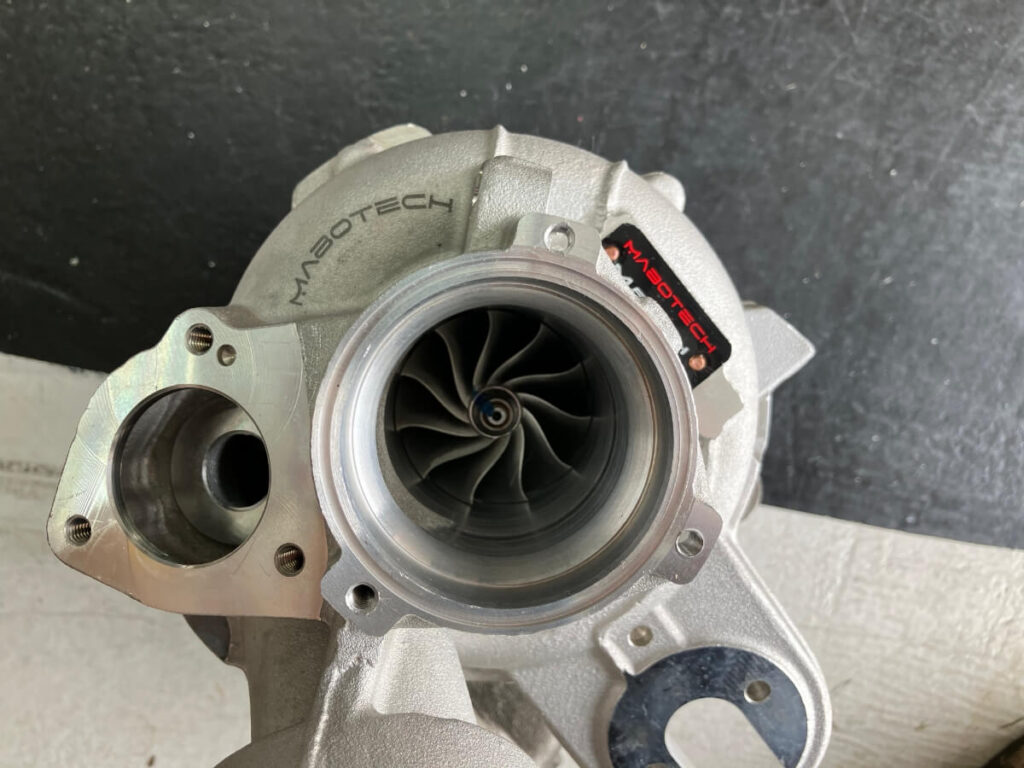
Results on the Mabotech website showed that the M520H is likely well-suited for a new phase of testing with my GTI, namely looking at how well parts perform in support of a “hybrid” turbocharger that is capable of higher power output.
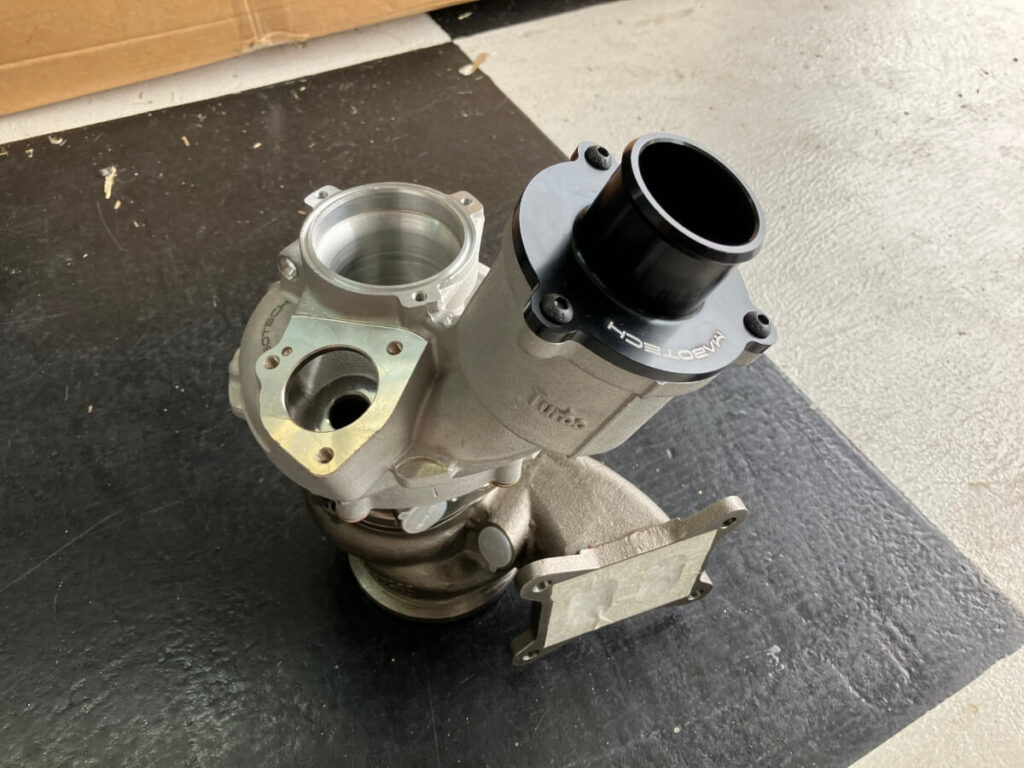
I’m looking forward to trying a ball-bearing turbo, although the step up in the size of the compressor, and turbine (57/52 versus ~55/47 for the IS38), will confound the benefits of the ball bearings insofar as a comparison with the boost onset of a journal bearing IS38+ is concerned.
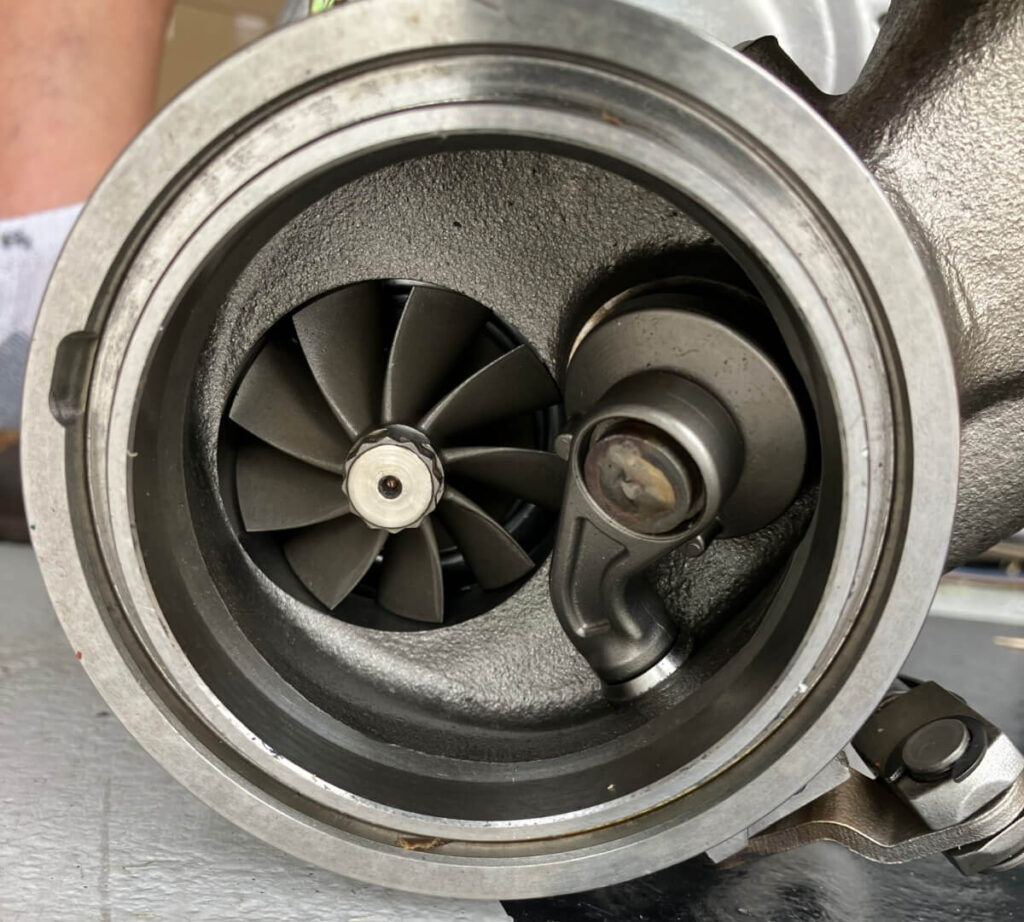
With the tire traction of my FWD GTI already posing issues with data collection I anticipate the Mabotech M520H turbo to further complicate some of my efforts.
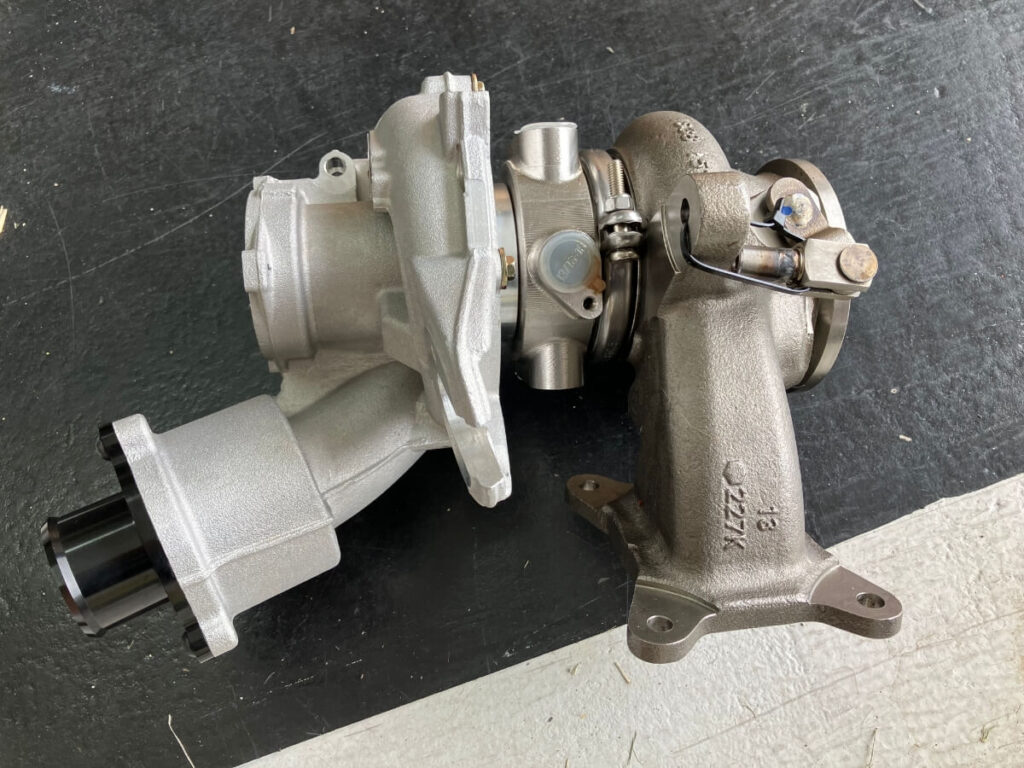
The Mabotech M520H uses a custom turbo inlet elbow to match the 60 mm turbo compressor inlet (versus 49 mm for an IHI turbo).
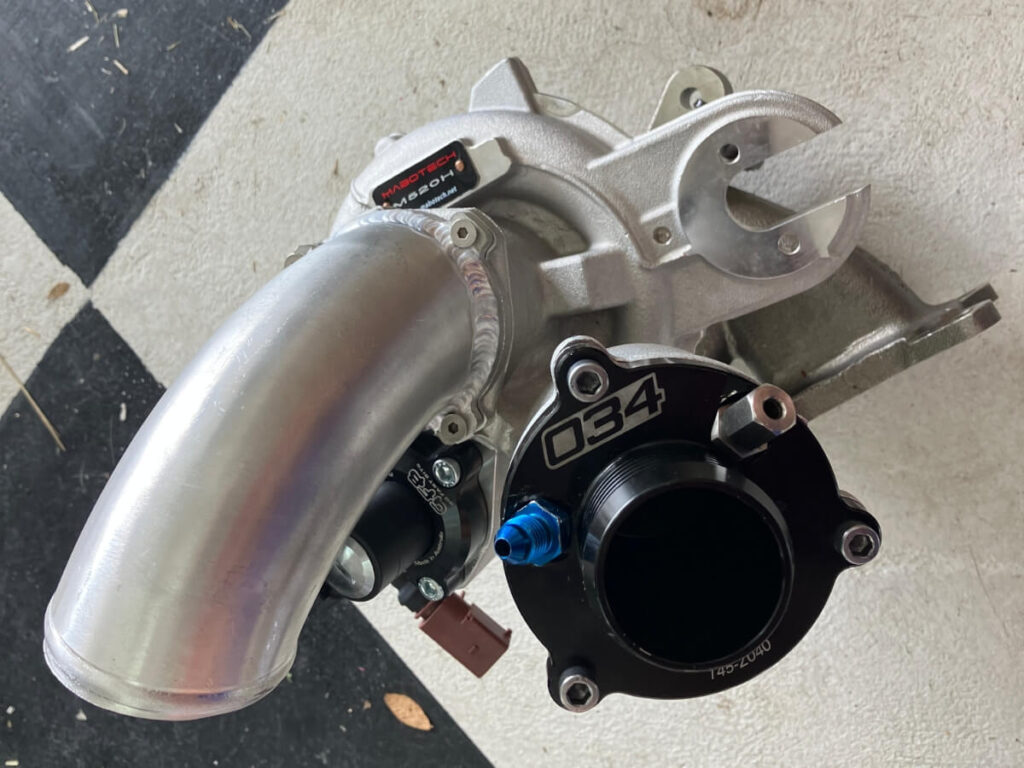
On the outlet end of the compressor housing, the M520 accepts an IHI-compatible turbo muffler delete, something I am glad for since I monitor the temperature exiting the compressor as well as the pressure at the compressor outlet using a 034 Motorsport turbo muffler delete.
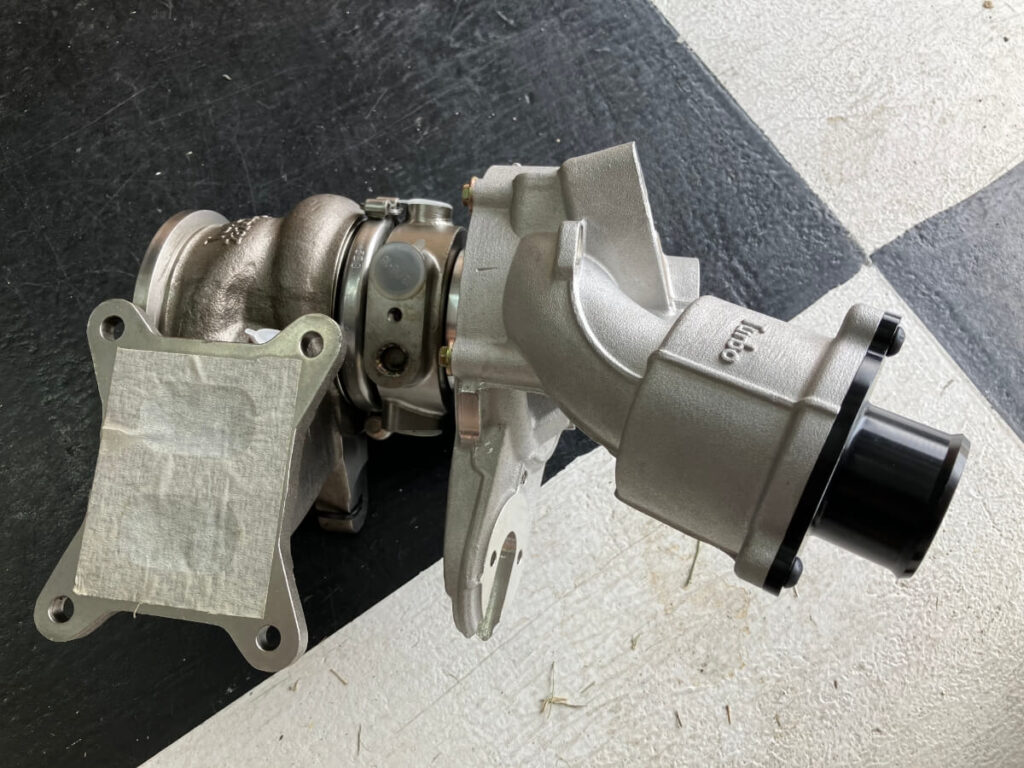

Its described as a “+500whp capable MQB turbocharger”.
Their graph shows 511 engine HP.
The claim is not supported by the data provided.
A flat torque curve from 3500 to over 6000 is quite different compared to say a G25-660.
I’d be cautious of a less than 2% failure rate. That’s 1 in 50 customers are potentially going to have their engines destroyed.
I don’t believe the dyno charts are showing Engine HP. I’ve used a DynoJet dyno several times and never had output presented as Engine HP. I don’t recall the WinPEP application having that conversion as an option, and since the device measures at the wheels, I presume those charts are showing power at the wheels.
I’m not understanding the point you are making in comparing the torque curve of this turbo to a G25-660.
A less than 2% failure rate would be less than 1 in 50 occurrences. A failed turbocharger does not necessarily lead to a “destroyed” engine. You need to determine the rate of turbocharger failure causing engine failure in order to compute the cumulative probability of a turbocharger failure leading to an engine failure. For example, if failed turbochargers destroy the engine in 1 out of 10 occurrences, then the probability of this turbocharger causing an engine failure is “less than” 0.2%.
It’s difficult to judge if the turbo failure rate is good or bad compared to other options since I don’t recall seeing this value being reported for other turbos, and “less than” indicates a range of possible values that are below 2%.
Graph is showing WHP not engine hp. Any torque curve is tied to octane, tuning and overall setup, a drag oriented setup will have a different torque curve than track or street optimized setups. I don’t recall any other company showing reliability as a selling point.
Do they (Mabotech) not have compressor maps for it?
The likelihood of failures can be reduced by limiting the turbo speed, provided such recommendations exist.
Not that I am aware of. The only turbo I know of that is specifically for this platform and has a compressor map is from Garrett. I’ve never seen a map for an IHI turbo, I would be very surprised to find one of these smaller aftermarket businesses expending the money to have a compressor map created for their compressor wheel.
Also, you then need a turbo that is modified to accept a speed sensor and logging equipment to monitor the rotation speed.
and Garett just recommends limiting the turbo speed))
I’m eager to read your review on this. I’m on the Mabotech M520H, but EA888 Gen3B. I found the low end lag is pretty bad. I guess due to engine limitations.
Love your past reviews! Best resource ever when deciding which upgrades to go for!
Thanks!
I’m looking forward to seeing how the experience changes with a larger turbo. I’m already planning to tweak my DSG tune using Stratified’s refinement option to account for the slower spooling hybrid. A comparison of spool times with the IS38 will be something I measure.
Nice choice. I couldnt recommend those Garrett turbos someone else mentioned. They’re basically hybrid versions of the fa20 wrx turbos, and are barely compatible with the routines our ecu uses for the wastegate. And frankly, over priced. Garrett definitely didn’t provide their best for this platform. That’s for sure. I’ve read tuners saying those garetts have to be shoe horned in with tuning, as if they were hardly meant to operate normally on our engines. Then you look at their compressor maps and the stock wrx turbo issues and negative behavior is totally present. Folks can do better for way less money.
If you’re referring to the Pmax Stage 1 I don’t agree with it being a poor choice. In fact, I purchased one not too long after it became available because I thought it would be well paired with the GTI. I’ve used Stratified for the last couple of tunes I’ve done and they have been very pleased with the Pmax Stg1. I also found the price very competitive for what the kit includes. What better turbo (in what regards) is there that is available for less?
The dtr comes to mind in both quality and price. I’m also a fan of any is38 that’s built tougher too. Such as the eqt one, the shuenk one (spelling?) etc
When you look at the garetts units one could’ve had by just spending a little more. Just a tiny bit more, and The build quality and feature’s gap widens tremendously! Hence why I said, Garett definitely didn’t offer their best. Even their “stage 2 pmax offering” isn’t great either. In terms of what U get for the money vs competitors and its quality.
And if one is ok with holding off purchasing and saving for a little longer, the doors to better built turbos flings wide open in a major way. And I’m not only referring to slightly laggy top end type turbos either.
With over 100 turbochargers to choose from there’s no shortage to keep a comparison shopper busy.
Absolutely, when lining up all the Garrett turbos. Including the oem built ones. U can tell these oem ones are built to very specific price points. So to base the pmax’s after those, of all the turbos in their portfolio, it just stings like crazy. Especially at that price
That’s just me tho
I think where the Pmax Stg1 sits against other GTI turbo options is good and the price is reasonable. I’m not disappointed with what it offers.
I won’t deny the fact that theres a market for peppy quick spoiling turbos. At least its not as bad as the first gen tpc20’s 😂
Maybe I’m jaded due to my being a Subaru owner. I dunno 🤷🏽♂️
But glad U and other folks like it. It’s your money after all, and no one should tell U how to enjoy it.
Hi Jeff,
Going back to this older post to update all on my M520H. The turbo lag is very much reduced after increasing timing above what the tuner would like, coming in at around 3500 rpm.
However, my EA888 Gen3B has an MAF, and I am stalling during 1st gear deceleration after a higher rev. It also stalls if I’m in Park, and rev twice in succession and immediately release the accelerator. Any ideas what would help?
Sorry, I don’t have any suggestions for correcting the issue.
Hi Jeff, First off, thank you for sharing all of your information. I recently went from an is38 to a pmax stage 1. It made a good improvement with very little change in response. However it has left me still wanting a little more, of course. so now I am trying to narrow down the next turbo up with the least impact to response and boost onset. How does the m520h feel in comparison to the is38? Is the difference in response noticable? I do a lot of town road driving so I like to punch it here and there while I am cruising around.
Thanks Harrison! It depends on how I am driving as to whether I noticed a difference from the IS38 to M520H. In my routine driving since I have a DSG it will downshift once I press the accelerator enough, and in that case, I didn’t notice a difference. When I log data, I switch to manual shifting so I can go full throttle at low RPM (~2000) and not downshift, and here the difference is noticeable, with the M520H taking longer to build boost from a low RPM.